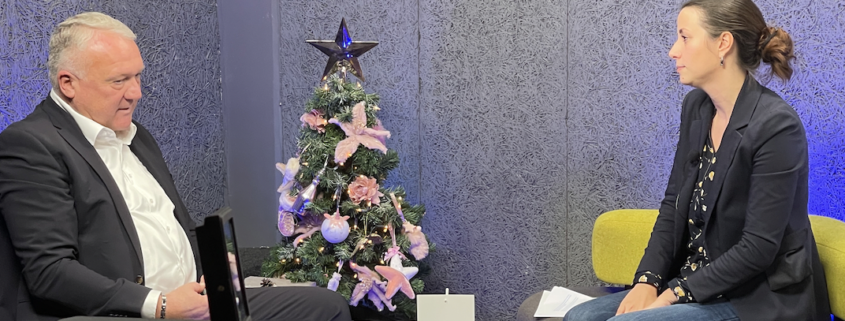“For me personally, it is not hard because I know who I am and how I want to stay. And above all, I know what I do not wish to become, ” said MEP Irena Joveva in a lengthy interview on the Gorenjska Television (GTV) channel about her work. She also talked about media freedom, the energy crisis, working for the benefit of young people and answered the question of what would be the first thing about the European Parliament she would change if she could.
She began by explaining that for MEPs too, almost everything has gone back to the way it was and that physical presence is again the norm, with the notable exception of the meetings of the Renew Europe political group, of which she is a member. She regretted that the majority in Parliament had refused to take advantage of the good practices of the system built during the pandemic, especially in terms of transparency of votes.
She added that she tries to organise her work in Brussels in such a way that her days are filled with work, but that this allows her to be more active in Slovenia.
She believes that politics is a matter of compromise and negotiation, but that respect for the rule of law, fundamental human rights and democracy is non-negotiable, and this is what the Renew Europe group, despite its diversity, is very much aware of. She added that “a typical day in the European Parliament is atypical”, as there is a great deal of variety –from weeks with more committee work, weeks devoted to the Renew Europe group and plenary weeks to missions across Europe and work in the country of origin. On top of that, there are many coordination and preparatory meetings, meetings with different organisations, experts, stakeholders and other MEPs, visitors to be received and events to be attended.
How does she stay true to herself? “Before going to bed, I think about the day and see if I can go to sleep without any guilt. The answer has to be yes, and it always is yes. If it weren’t, it would mean that I have “messed up” something in my life,” Joveva replied.
The discussion also turned to media freedom, where the MEP said that she did not believe for a moment that voters would not support changes for a better public service broadcaster. Still, she regretted that some politicians were abusing the right to a referendum through manipulation and lies, going so far as to compare the current situation in Slovenia with Nazi Germany, which was completely unacceptable.
She reiterated the importance of the European Media Freedom Act, for which she is likely to act as rapporteur on behalf of Renew Europe. The Act will bring a new set of rules and mechanisms aimed at promoting media pluralism and independence.
The presenter also asked the MEP about Hungary and Poland, and Joveva responded that today these two countries would not be admitted to the European Union if measured by the standards required from potential new members. “We can see that there has been no consideration of the possibility that the situation in a country could worsen after it has joined the Union. We do not have sufficient mechanisms in place and I would like to stress that the situation in Hungary and Poland is really worrying.”
Another topic mentioned was the letter to the directors of digital platforms about the non-use of Slovene, and the MEP said that she was happy to see that things were moving, albeit slowly, and that it is gratifying to know that one had contributed to these developments. She insisted that it does not matter whether we speak foreign languages or not, as the right to access content in one’s mother tongue is something fundamental, and, most importantly, that blind, partially sighted, deaf and hard of hearing people should not be discriminated against.
Touching on the current energy crisis, Joveva first reaffirmed her resolute support for Ukraine in its legitimate struggle for existence in the face of intense Russian aggression, and then went on to present her opinion that the energy crisis could be solved by putting a price cap on Russian oil, but that it should be as low as possible:
“The long-term solution is to invest in renewable energy and to provide the necessary infrastructure for real independence from fossil fuels.” Joveva also called for a fund similar to the Recovery and Resilience Facility.
Asked what would be the first thing that she would change in the functioning of the European Parliament, she replied that she would determine a single seat for it, either in Brussels or Strasbourg, as this is the only sensible thing to do from an environmental, financial and logistical point of view. Another thing she would wish to see is that the work of the MEPs were followed and presented to the public more comprehensively.
The MEP concluded the interview with a New Year greeting, wishing the audience a peaceful Christmas and a healthy and happy 2023, and above all that we might live in a world where manipulators, liars, war profiteers and divisive people do not stand a chance.
You can watch the full interview with the MEP here.





Leave a Reply
Want to join the discussion?Feel free to contribute!